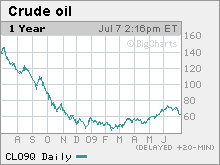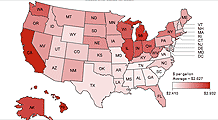Oil slides toward $60
Futures fall after inventory report shows large buildup. OPEC says it expects demand to remain soft for years.
NEW YORK (Reuters) -- Oil dropped more than 4% near $60 a barrel Wednesday after a U.S. government report showed that distillate stocks have risen near a 25-year high, reinforcing worries about a potential economic rebound.
U.S. crude fell $2.79, or almost 3%, to settle at $60.14 a barrel Wednesday.
That's the lowest settle price since May 19, when crude ended at $59.65 a barrel Wednesday.
"This market was already in a downward mood and this report did nothing to alleviate this situation ... distillate stocks are showing signs that the economy has not had any real improvements yet," said Mike Zarembski, senior commodities analyst at optionsXpress in Chicago.
Distillate stocks, including diesel, the primary fuel of industry, climbed by 3.7 million barrels last week, compared with an expected 2-million-barrel rise, according to the U.S. Energy Information Administration's weekly report.
The data also showed gasoline stocks had risen by 1.9 million barrels despite the Fourth of July holiday weekend which is traditionally the peak travel weekend of the summer driving season.
"It looks like we're going to make it through the summer driving season with ample supplies and that's definitely not bullish for this market," Zarembski said.
Oil prices have dropped from peaks above $70 a barrel last month, the highest this year, as expectations of an economic recovery have faltered and U.S. fuel stocks have risen in line with subdued demand.
Producer group OPEC in its 2009 World Oil Outlook released Wednesday said consumption of its crude would not return to 31 million barrels per day (bpd), the level it averaged in 2008 before the economic crisis cut oil use, until 2013.
Commodities, including oil, were also pressured by a statement from the U.S. Commodities Futures Trading Commission (CFTC) this week that it was considering tougher position limits to try to curb speculation.
Market players were also monitoring the meeting of the Group of Eight major industrialized nations in the central Italian city of L'Aquila, which continues until Friday, where the group called for reduced volatility in energy markets.
However, Russian President Dmitry Medvedev told the summit that it was impossible to regulate oil prices via administrative measures and said the fair price for oil would be $70-$80 per barrel. ![]()



